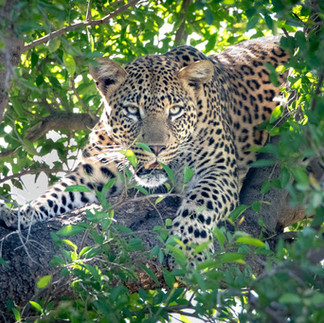WHY THE GREEN SEASON IS SUCH A MAGICAL TIME FOR A SAFARI
- All Out Safaris

- Oct 14, 2025
- 4 min read
Contrary to popular belief, the rainy green season in South Africa is a spectacular time for wildlife viewing. The bush transforms into a lush, vibrant paradise, full of life, colour, and energy. It’s a time when the savanna feels alive, painted in shades of emerald and gold, with dramatic skies that make every game drive feel cinematic.
Many travellers assume that the green season means less wildlife activity but that couldn’t be further from the truth. In fact, this time of year offers some of the most beautiful and rewarding safari experiences imaginable.
When Is the Green Season?
The green season typically runs from November to the end of April, with the heaviest rains falling around December. During this time, afternoon thunderstorms breathe life into the landscape, filling rivers and pans, refreshing the bush, and turning the dusty winter scenery into a lush haven.
While the rain can be dramatic, it’s often short-lived ,clearing quickly to reveal clear skies, golden light, and stunning photographic conditions.
A Paradise for Birdwatchers and Photographers
Summer in South Africa is a dream for bird enthusiasts. Migrant species return in their thousands, and birds of prey are particularly active, providing countless opportunities for photography. From colourful rollers and bee-eaters to majestic eagles and kites, the skies are bursting with life.
The increased insect activity, snakes, lizards, frogs, and butterflies all add to the sensory experience. For photographers, the contrast between green vegetation and dramatic skies makes for vivid, high-impact images that you simply don’t get during the dry season.
How Does Wildlife Viewing Differ in the Green Season?
People often say game viewing in summer is more difficult than in winter but that isn’t necessarily true. Yes, the bush is denser, and animals can blend into the long grass, but with the right guide, this season can be every bit as rewarding.
The abundance of natural water means animals don’t always need to congregate at major waterholes. Instead, they’re spread throughout the bush, giving guests the chance to enjoy sightings in a more natural, less crowded way.
The warmer temperatures can encourage predators like lions to rest earlier in the day, but it also means cooler mornings and evenings come alive with activity from elephants bathing in rivers to leopards patrolling their territories.
It’s not more difficult, it’s simply different.
The Highlights of a Summer Safari (November – April) So, what makes this time of year so special?
The Scenery
It’s lush. It’s green. It’s breathtaking. After the rains, the bush is rejuvenated and full of life. The air feels clean, the sunsets are electric, and the smell of wet earth after a storm is unforgettable.
Remarkable Birdlife
With the abundance of insects, reptiles, and amphibians, the birdlife is exceptional. Summer is when you’ll witness raptors soaring overhead and migratory birds displaying their vibrant plumage, perfect for those who love wildlife photography.
Calving Season
From wildebeest and impala to warthogs and zebra, many species give birth during this time. Impala herds often double in size, and the sight of hundreds of young animals exploring their world is simply heart-warming. It’s a photographer’s dream and a feast for predators.
Predator Action
If you love big cats, this is your season. With so many young animals around, predators are active and visible.
Lions are often found lounging on rocky outcrops, scanning the plains.
Cheetahs use termite mounds and fallen trees as vantage points to spot prey.
Leopards spend more time in trees, enjoying the cool shade and better views of their surroundings.
Interestingly, in the early mornings, predators prefer walking on the roads to avoid the wet grass, a bonus for keen-eyed safari-goers.
Leopards, in particular, shine during this season their rich coats contrasting beautifully with the green backdrop. Many of our most iconic leopard and predator sightings at All Out Safaris have happened during this time of year.
A Few Practical Tips for Green Season Safaris
Yes, the summer months can be hot, and mosquitoes are more common, especially in malaria areas like Kruger National Park. However, with anti-malaria medication, good mosquito repellent, and protective netting at lodges, you’ll be perfectly safe.
If you’d prefer to avoid malaria zones entirely, Madikwe Game Reserve is a fantastic malaria-free alternative that still offers world-class wildlife experiences.
When walking around at night, always carry a torch and stick to pathways. At unfenced lodges such as those in the Sabi Sand Game Reserve, staff or guides will always accompany you safely to your room.
Peaceful and Private Safaris
One of the best-kept secrets of the green season is how quiet it is. Apart from December and early January, which coincide with school holidays, this time of year sees far fewer visitors.
That means fewer vehicles at sightings and a much more exclusive safari experience. You’ll often have prime wildlife encounters all to yourself, the kind of intimate moments that make a safari truly special.
If you’re looking for a more private and peaceful adventure, we highly recommend travelling outside of school holidays. The sightings are superb, and the overall experience feels deeply personal.
Experience the Green Season with All Out Safaris
At All Out Safaris, we love showcasing the beauty and diversity of South Africa’s wildlife throughout the year, but there’s something undeniably magical about the green season.
From the soft morning light after an overnight storm to the sight of a leopard silhouetted against a thundercloud, this time of year offers a unique connection to the natural world.
Join us for a private or photographic safari and experience South Africa in full colour. Whether you’re a first-time traveller or a seasoned safari enthusiast, we’ll curate a journey that celebrates the beauty of nature at its most vibrant.
Book your South African safari with All Out Safaris and discover why the green season is one of the best-kept secrets in the wild.



























Comments